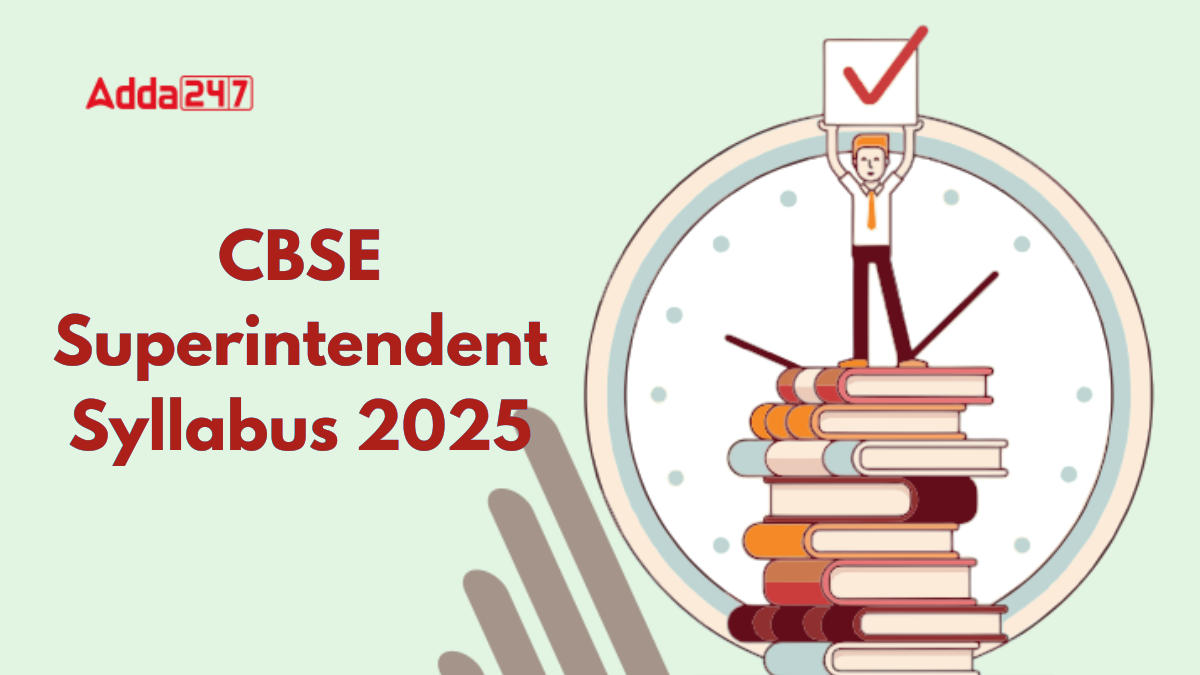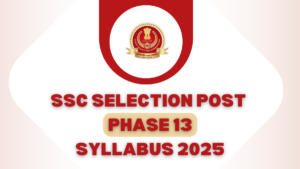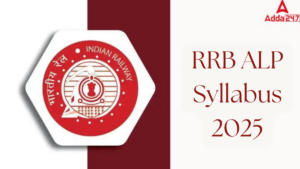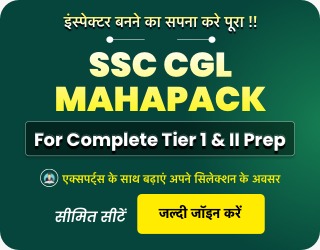Table of Contents
The Central Board of Secondary Education (CBSE) has announced 142 vacancies for the Superintendent position through the CBSE Recruitment 2025 drive, as stated in its official notification. Candidates should start their preparation with CBSE Superintendent Syllabus 2025, it will help them understand the weightage of each section and allow them to plan their preparation effectively. In this article, we will provide a detailed breakdown of the topics covered in each section of the syllabus, along with the exam pattern and marking scheme for Tier 1 and Tier 2.
Latest Updates:
- CBSE Superintendent Exam 2025 will be conducted on 20th April 2025 in evening shift.
- The exam mode of CBSE Superintendent is Offline.
CBSE Superintendent Syllabus 2025
Knowing the CBSE Superintendent Syllabus and Exam Pattern is important for better preparation and improving your chances of getting the Superintendent job. The syllabus helps you understand which topics will be covered in the exam and focus on the areas that need more attention. The CBSE Superintendent Syllabus for Tier 1 is divided into five sections: Current Affairs, Reasoning, Arithmetic, English, and Computer Proficiency.
| CBSE Superintendent Syllabus: Highlights | |
| Examination Body | Central Board of Secondary Education |
| Post Name | Superintendent |
| Vacancy | 142 |
| Selection Process | Tier 1, Tier 2, Skill Test |
| Exam Mode | Offline |
| Negative marking | 1 Mark |
| Total Marks | Tier 1 (450 Marks) and Tier 2 (300 Marks) |
CBSE Superintendent Admit Card 2025- Click to Check
CBSE Superintendent Exam Pattern 2025
The CBSE Superintendent Exam Pattern 2025 consists of two stages. The first stage is Tier 1, which includes 150 questions spread across five sections, with a total of 450 marks. It tests areas like Current Affairs, Reasoning, Arithmetic, English, and Computer Proficiency. The second stage is Tier 2, which features both objective and descriptive questions, covering topics such as Indian History, Economy, Governance, and English, amounting to a total of 300 marks.
CBSE Superintendent Exam Pattern for Tier 1
The exam consists of 150 questions, with a total of 450 marks. These questions are divided into five sections, each containing 30 questions worth 90 marks. Additionally, there is a negative marking system in place, where one mark is deducted for every incorrect answer.
| CBSE Superintendent Tier 1 Exam Pattern 2025 | |||
| Part | Subjects | No. of Questions | Total Marks |
| Part I | Current Affairs, General Awareness | 30 | 90 |
| Part II | General Intelligence, General Mental Ability, Logical Reasoning and Analytical Ability | 30 | 90 |
| Part III | Data Interpretation, Arithmetical & Arithmetical Ability | 30 | 90 |
| Part IV | General Hindi and English | 30 | 90 |
| Part V | Computer Proficiency | 30 | 90 |
| Total | 150 | 450 | |
CBSE Superintendent Exam Pattern for Tier 2
The CBSE Superintendent Exam pattern for the Tier 2 exam includes both objective and descriptive questions. Candidates can check the table below for the detailed Tier 2 exam pattern.
| CBSE Superintendent Tier 2 Exam Pattern 2025 | ||||
|
Sections
|
Objective Type | Descriptive Type | ||
| No. of Question | Total Marks | No. of Question | Total Marks | |
| Indian History and Culture | 4 | 12 | 4 | 20 |
| Science & Technology | 4 | 12 | 4 | 20 |
| Indian Economy | 4 | 12 | 4 | 20 |
| Indian Geography | 4 | 12 | 4 | 20 |
| Current Affairs | 10 | 30 | 4 | 20 |
| Concepts Issued and Dynamics of Public Administration and Management Syllabus | 8 | 24 | 4 | 20 |
| Constitution of India, Polity, Governance | 8 | 24 | 4 | 20 |
| English Language and Comprehension | 8 | 24 | 2 | 10 |
| Total | 50 | 150 | 30 | 150 |
CBSE Superintendent Syllabus 2025 for Tier 1 and Tier 2
To maximize your chances of obtaining the Superintendent position, understanding the CBSE Superintendent Syllabus and Exam Pattern is key to effective preparation. The syllabus provides clarity on the topics included in the exam, helping you identify your strengths and weaknesses and prioritize areas for improvement. Below is a summary of the CBSE Superintendent Syllabus 2025 for your convenience.
CBSE Superintendent Tier 1 Syllabus 2025
To ensure successful preparation, it is essential to carefully examine the CBSE Superintendent Syllabus as provided in the official CBSE notification. Understanding the syllabus helps candidates identify the key topics and sub-topics that are likely to be tested. Below, we have provided a detailed subject-wise breakdown of the Tier 1 CBSE Superintendent Syllabus for your convenience.
General Mental Ability/General Intelligence/Logical Reasoning And Analytical Ability
- Analytical Reasoning
- Mental Ability: Number series, Letter series, Odd one out, Analogy
- Coding-Decoding, Problems Relating to Relations, Shapes, and their sub-sections
- Basic Numeracy: Elementary knowledge of Mathematical and Statistical Analysis
- Data Analysis (Tables, Bar diagram, Line graph, Pie-chart)
Arithmetical & Numerical Ability, Data Interpretation
The topics related to the Arithmetical & Numerical Ability, Data Interpretation has been mentioned in the table given below for the candidates to start your preparation.
| Subject | Topics |
| Arithmetic |
(i) Number systems: Natural Numbers, Integers, Rational and Irrational numbers, Real numbers, Divisors of an Integer, prime Integers, L.C.M. and H.C.F. of integers and their interrelationships,
(ii) Average,
(iii) Ratio and proportion
(iv) Percentage,
(v) Profit and Loss,
(vi) Simple and compound Interests,
(vii) Work and Time,
(viii) Speed, Time and Distance
|
| Algebra |
(i) Factors of polynomials, L.C.M. and H.C.F. of polynomials and their interrelationship, Remainder theorem, simultaneous linear equations, quadratic equations,
(ii) Set Theory:- Set, null set, subsets and proper subsets of a set,
operations (Union, Intersections, difference, symmetric difference) between sets, Venn diagram |
| Geometry |
(i) Constructions and theorems regarding triangles, rectangle, square, trapezium and circles, their perimeter and area,
(ii) Volume and surface area of sphere, right circular cylinder, right circular Cone and Cube.
|
| Statistics |
Collection of data, Classification of data, frequency, frequency distribution, tabulation, cumulative frequency, Representation of data – Bar diagram, Pie chart, histogram, frequency polygon, cumulative frequency curves (gives), Measures of Central tendency: Arithmetic Mean, Median and Mode.
|
Current Affairs & General Awareness Syllabus
- Major Current Events and Issues in India and the World
- Events of National and International Importance
- Persons and places in recent news
- Games and Sports related Activities etc.
- Social Media, Role of ICT and AI in Modern Times
General Hindi and General English
| Subject | Topics |
| General Hindi |
|
| General English |
|
Computer Proficiency Syllabus
- Software: Basic knowledge of MS Office (Word, Excel, PowerPoint).
- Computer Basics: Organization, CPU, input/output devices, memory, ports, Windows Explorer.
- Networking & Cyber Security: Networking devices, security threats (hacking, viruses), preventive measures.
- Internet & E-mails: Browsing, searching, downloading/uploading, managing email, e-banking.
CBSE Superintendent Tier 2 Syllabus 2025
Here is the syllabus for CBSE Superintendent Tier 2 Syllabus 2025 in the table below.
| Subject | Topics |
| Indian History and Culture |
|
| Indian Economy |
|
| Indian Geography |
|
| Science & Technology |
|
| Constitution Of India, Polity, Governance |
|
| Current Affairs |
|
| Concepts, Issued And Dynamics Of Public Administration And Management Syllabus |
|
CBSE Superintendent Exam Preparation Tips
Here are some useful tips to help you prepare for the CBSE Superintendent exam:
- Study Official Syllabus – Focus on relevant topics to avoid unnecessary effort.
- Enhance General Awareness – Stay updated with current affairs & government policies.
- Improve Management & Administration Knowledge – Learn about office procedures & rules.
- Practice Logical Reasoning & Quantitative Aptitude – Solve previous year papers.
- Strengthen English & Communication Skills – Focus on grammar, comprehension & drafting.
- Time Management – Create a study plan & allocate time for revisions.
- Attempt Mock Tests – Improve accuracy & speed through practice exams.
| Important Links: | |
| CBSE Recruitment 2025 | CBSE Superintendent Previous Year Paper |
| CBSE Junior Assistant Mock Test 2025 | CBSE Superintendent Mock Test |



 SSC Selection Post Phase 13 Syllabus 202...
SSC Selection Post Phase 13 Syllabus 202...
 RRB ALP Syllabus 2025 For CBT 1, 2 and C...
RRB ALP Syllabus 2025 For CBT 1, 2 and C...
 CBSE Junior Assistant Syllabus 2025, Exa...
CBSE Junior Assistant Syllabus 2025, Exa...




